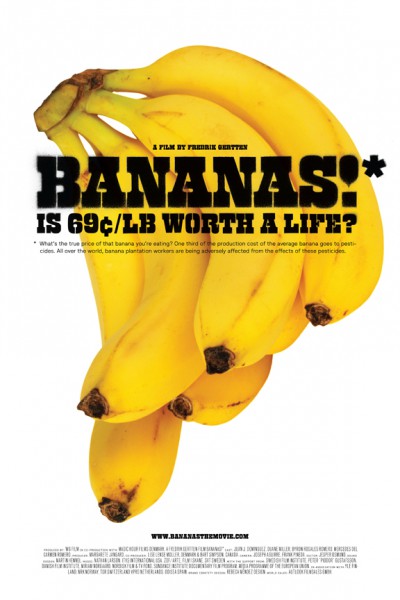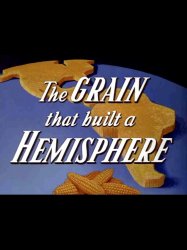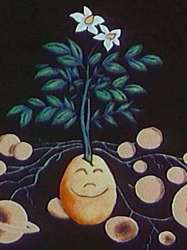Bananas!* is a film of genre Documentary directed by Fredrik Gertten released in USA on 9 october 2009
Bananas!* (2009)

If you like this film, let us know!
- Infos
- Casting
- Technical infos
- Photos
- Videos
- Film quotes
- Characters
- Music
- Awards
Released in USA 9 october 2009
Length 1h27
Directed by Fredrik Gertten
Genres Documentary
Themes Environmental films, Films about the labor movement, Documentary films about business, Documentary films about environmental issues, Documentaire sur le monde du travail
Rating68%










Bananas!* is a 2009 Swedish documentary directed by Fredrik Gertten about a conflict between the Dole Food Company and banana plantation workers in Nicaragua over alleged cases of sterility caused by the pesticide DBCP.
The film was criticized by Dole for containing "patent falsehoods". After a screening at the Los Angeles Film Festival in June 2009, Gertten was sued for defamation by Dole on 8 July. The lawsuit was preceded by threats of legal action from Dole aimed against the LA Film Festival, which resulted in sponsors pulling support and the film being removed from competition. Dole dropped their lawsuit against Fredrik Gertten and Bananas!* on 15 October 2009.
In September 2009, the Swedish parliament members Mats Johansson (M) and Luciano Astudillo (S) took the initiative of displaying the movie in the Parliament of Sweden, this being its premiere in Sweden.
In late 2010 a court in Los Angeles decided in favor of the movie crew, making it possible to release the film in the USA. A judge awarded the filmmakers nearly $200,000 in fees and costs.
In 2011, Gertten directed the film Big Boys Gone Bananas!* about how the company was sued by Dole.
Synopsis
Au Nicaragua, les travailleurs paient un lourd tribut pour approvisionner le monde entier en bananes bon marché, et l'avocat Juan Dominguez compte bien les aider.Comments
Leave comment :
Suggestions of similar film to Bananas!*
There are 1 films with the same director, 8969 with the same cinematographic genres, 1934 films with the same themes (including 16 films with the same 5 themes than Bananas!*), to have finally 70 suggestions of similar films.If you liked Bananas!*, you will probably like those similar films :

Big Boys Gone Bananas!* (2011)
, 1h30Directed by Fredrik Gertten
Origin Suede
Genres Drama, Documentary
Themes Documentary films about business, Documentary films about the film industry, Documentaire sur une personnalité, Autobiographical documentary films
Actors Fredrik Gertten, Alex Rivera
Rating75%





Le film traite de la façon dont la société de production de Gertten a été poursuivie en justice par Dole Food Company pour son documentaire de 2009, Bananas!*.
 , 11minutes
, 11minutesDirected by Bill Justice, Bill Roberts
Origin USA
Genres War, Documentary, Animation
Themes Environmental films, Politique, Films about the labor movement, Documentary films about business, Documentary films about environmental issues, Documentary films about war, Documentary films about historical events, Documentaire sur le monde du travail, Political films, Documentary films about World War II, Children's films
Rating59%





Explication de l'histoire du maïs, depuis sa découverte par les indiens à son usage moderne puis son importance dans l'économie mondiale.

The Hole Story (2011)
Directed by Richard Desjardins, Robert Monderie
Origin Canada
Genres Documentary
Themes Environmental films, Films about the labor movement, Documentary films about business, Documentary films about environmental issues, Documentaire sur le monde du travail
Rating76%





Au Canada, le nord du Québec et de l'Ontario recèle d'immenses richesses minières, qui ont généré des profits faramineux, au mépris de l'environnement et de la santé des travailleurs. C'est une histoire qui passe par le nickel de Sudbury, l'argent de Cobalt, l'or de Timmins, le cuivre de Rouyn.
 , 1h48
, 1h48Directed by Marie-Monique Robin
Origin France
Genres Documentary
Themes Environmental films, La mondialisation, Films about the labor movement, Documentary films about business, Documentaire sur l'altermondialisme, Documentary films about environmental issues, Documentaire sur le monde du travail
Rating79%





The film reports many controversies surrounding the use and promotion of genetically modified seeds, polychlorinated biphenyls (PCBs), Agent Orange, and bovine growth hormone. Cases in the United States (including Anniston, Alabama), Canada, India, Mexico, Paraguay, the United Kingdom (Scotland) and France, are explored, claiming that the Monsanto corporation's collusion with governments, pressure tactics, suppression and manipulation of scientific data, and extra-legal practices aided the company's attempts at dominating global agriculture. Scientists, representatives of the United States Food and Drug Administration and the United States Environmental Protection Agency, civil society representatives, victims of the company’s activities, lawyers, and politicians are interviewed.
 , 22minutes
, 22minutesOrigin Danemark
Genres Documentary, Animation
Themes Cooking films, Environmental films, Films about the labor movement, Documentaire sur la cuisine, Documentary films about business, Documentary films about environmental issues, Documentary films about historical events, Documentaire sur le monde du travail, Mise en scène d'une plante
Rating74%





Fiche technique Directeur et auteur : Anders Sørensen ;

Koundi et le jeudi national (2010)
, 1h26Origin Cameroun
Genres Documentary
Themes Environmental films, Films about the labor movement, Documentary films about business, Documentary films about environmental issues, Documentaire sur le monde paysan, Documentaire sur le monde du travail
Koundi is a large village with around 1,200 inhabitants, located in Cameroon's East Province. Aware of Koundi's richness in timber, the villagers decide to use it to alleviate poverty. They organise a union, the Organisation for Communal Interests, and create a cocoa plantation over several hectares to be able to depend on themselves. They also institute "National Thursday": Once a month, they all work on the development of the cocoa plantation. Village life through the prism of self-management.

Katanga Business (2009)
, 1h30Directed by Thierry Michel
Origin Belgique
Genres Documentary
Themes Films set in Africa, Environmental films, La mondialisation, Films about the labor movement, Documentary films about business, Documentary films about environmental issues, Documentaire sur le monde du travail
Rating68%





The province of Katanga in the south east of the Democratic Republic of the Congo (DRC) has huge mineral riches including uranium, zinc, copper and cobalt.

Voices of Transition (2012)
, 1h5Origin France
Genres Documentary
Themes Environmental films, La mondialisation, Films about the labor movement, Documentary films about business, Documentary films about environmental issues, Documentary films about technology, Documentaire sur le monde du travail, Disaster films
Rating75%





Using interviews and overlays of graphics and text, the film presents the current problems facing industrial agriculture. It explores why in the interviewees' view the current industrial model is not up to the task of feeding the world's people. According to the film every calorie of energy contained in a food source currently takes between 10 and 20 calories of crude oil in the production of fertilizers and transportation to produce, leading to a strong dependence of the cost of food on oil prices. As a result of peak oil and increasing oil prices this dependence will lead to ever increasing food prices. According to the film, this dependence already represents a significant weak-spot in the global food supply chain. Additionally, agriculture is already responsible for 40% of greenhouse gas emissions, contributing to climate change. Furthermore, the film argues that the overuse of inorganic fertilizers has been responsible for the loss of soil fertility and threatens the complete loss of usable soil within the next decades through soil erosion and sinking crop yields. These effects, according to the film, can only be partly mitigated by the increased use of those same fertilizers. The loss of workplaces, the concentration of land in the hands of a few (allegedly a farm closes every 23 minutes in France) as well as the dependence on large corporations are enumerated as side effects of the industrialisation of agriculture since the 1920s. Companies, such as Monsanto and Bayer, control everything from seed stock to fertilizers and the necessary chemical mixes for hybrid plants, thereby controlling the entire supply chain. The film argues that this development was supported through subsidies from the World Bank. Interviews with Vandana Shiva, the founder of the Transition Towns movement Rob Hopkins and various agricultural experts serve to argue this viewpoint. The dependence on crude oil is illustrated through the example of the wholesale food market in Rungis.

Cursed for Gold (2008)
, 1h33Directed by Olivier Weber
Origin France
Genres Documentary
Themes Environmental films, La mondialisation, Films about the labor movement, Documentary films about business, Documentaire sur l'altermondialisme, Documentary films about environmental issues, Documentaire sur le monde du travail, Documentary films about nature, L'Or

We Feed the World (2005)
, 1h36Directed by Erwin Wagenhofer
Origin Austria
Genres Documentary
Themes Cooking films, Environmental films, La mondialisation, Films about the labor movement, Documentaire sur la cuisine, Documentary films about business, Documentaire sur l'altermondialisme, Documentary films about environmental issues, Documentaire sur la malbouffe, Documentaire sur le monde paysan, Documentary films about health care, Documentaire sur le monde du travail
Rating74%





Avec We Feed the World, le documentariste Erwin Wagenhofer propose aux spectateurs un regard sur l'agriculture mondiale moderne. En passant par la Roumanie, l'Autriche, le Brésil, la France et l'Espagne, son enquête se focalise sur la manière dont est fabriqué ce qui arrive dans notre assiette. Il montre que la domination du Nord sur le Sud est prégnante. Comment est-il possible qu'en Afrique l'on achète des produits européens ou asiatiques comme le poulet thaïlandais ? Le réalisateur présente une face peu connue de la mondialisation : en achetant un poulet industriel, on contribue au défrichement de l'Amazonie car le Brésil déforeste pour cultiver le soja qui sert à nourrir les volailles élevées en batterie (90 % de la production de soja du Brésil est exportée). Le documentaire souligne également la différence entre industrie agroalimentaire et petite exploitation. We Feed the World adopte un style « coup de poing » visant à éveiller les consciences.
 Connection
Connection